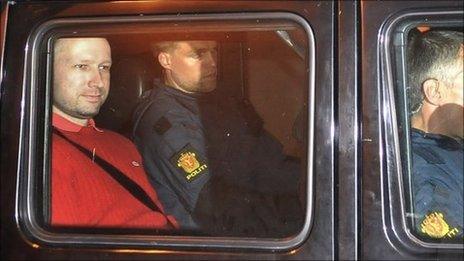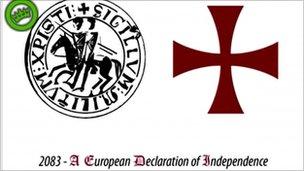Should killers be given a platform?
- Published
- comments

The publicising of excerpts of Anders Behring Breivik's 1,500-page manifesto has caused controversy. So should the words and thoughts of a killer be publicised or is it just giving a platform to extremist views?
The Norwegian courts decided to close the hearing of the man responsible for the massacre to the public and media, stating that Breivik might have used it to send signals to accomplices.
But for some there will have been relief that he has been denied a platform to voice his opinions to a wide audience.
Already his views - as expressed in his 2083: A European Declaration of Independence manifesto - have received vast attention that would never have arisen without the killings.
There is always a public appetite for context and background to explain the actions of mass killers. In the aftermath of a tragedy, the "why?" often becomes as important as the "what?"
And this is not the first time a political ideology has been given publicity in the wake of a tragedy.
In 1995, the 35,000-word manifesto of Ted Kaczynski, widely known as the Unabomber, external, was published in both the Washington Post and the New York Times in full.
After 16 bombings over nearly 20 years, killing three and injuring 23, Kaczynski promised to stop his bombings if his manifesto was published in one of the two newspapers.
It was eventually done at the request of the police, in the hope that it could assist in his capture.
Kaczynski was caught when his brother came forward after reading the manifesto, but some think that catering to the Unabomber's demands still made repeat attacks more likely.
"It was a mistake to publish Unabomber's manifesto," says criminologist Prof James Fox, of Northeastern University in Boston, who has written extensively on Kaczynski.
"The justification that was used that it needed to be in public hands to help with recognition was hypocritical. Had the manifesto not been published, the crime still would have been solved."
Oxygen of publicity
But for other revelations of a killer's views, catching the culprit is not the motive.

Seung-Hui Cho sent a statement to broadcaster NBC which prompted controversy
Following the Virginia Tech massacre of 2007, where 32 people were killed and 25 wounded in two separate shootings by Seung-Hui Cho before he killed himself, the US television network NBC was sent a tape showing Cho making a lengthy statement.
The decision to show it prompted victims' families to boycott interviews with the network and critics said it provided him with the "oxygen of publicity" he was craving. But other US networks had also run clips from the video, as did the BBC and Sky News in the UK.
"You can claim all you want it's for the good of the public but it puts a killer in the spotlight," says Prof Fox.
"For some people, he may even become a hero. It's OK to shed light on a crime but it's an entirely different thing to place a spotlight on it."
Commentators came to the defence of NBC and the other broadcasters, saying that the video provided useful insight into Cho's motives.
"The accusation that the NBC broadcasts may provoke copycat attacks - the most serious charge against the network - appears to rest on a notion of severe mental illness as contagious," wrote Bronwen Maddox of the Times., external
But for those with extreme views, doing something drastic is often seen as the only way to get their point across.
"We've seen it before people know now that if they do a big shooting spree like this, they will get attention," says philosopher Julian Baggini.
"Someone who does this kind of thing is probably somewhat deluded anyway. They are going to believe themselves to be important and in a way how people react is neither here nor there.
"But in terms of people living in a world where this is a surefire way of getting your message out, it creates conditions for future harm."
Some have already drawn parallels - here in the Daily Telegraph, external - between the Unabomber's manifesto and Breivik's.
But for many in the media, there is a widespread belief that making hearings and manifestos public is very much in the public interest.
"I think it [keeping the hearing private] is a bad thing," says Gro Holm, director of news at the Norwegian Broadcasting Corporation (NRK).
"One of the things the prime minister said was that it was going to be a more open society. I think in the media we are generally more in favour of open hearings. This is very important to Norwegian society."
Norwegian Prime Minister Jens Stoltenberg has promised that the country will remain "open and democratic".
No alternative
Advocates of free speech believe that opening up their arguments to scrutiny is the best way to debunk them, without any other viable option.
"I don't understand what the alternative is [to representing his views in mainstream media]," says Jonathan Heawood, director of English PEN, an organisation which supports freedom for writers.
"If you are saying that we need someway of stopping his manifesto being circulated then we need to have some kind of law that would make it crime. I'm not sure that's a law in practice that we want to have.

Breivik's manifesto is an often rambling, 1,500-page account of the his beliefs and plans
"There are more risks in limiting free speech than in opening it up. The more you bring the light of day to these beliefs, the more you give people the chance to destroy them in public debates."
And for much of the media, the decision has been made - in the case of the Norwegian massacre and others - that reporting the facts is the most important thing, no matter how uncomfortable they may be.
"A man like this has the right to speak despite what he has done," says Holm.
"People are curious to see who the man is who did this and get an impression of his personality. I think we are capable of handling it."
Additional reporting by Clare Spencer